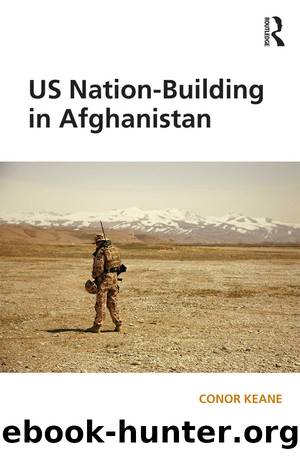US Nation-Building in Afghanistan by Conor Keane

Author:Conor Keane [Keane, Conor]
Language: eng
Format: epub
ISBN: 9781472474841
Publisher: Taylor and Francis
Published: 2016-03-30T16:00:00+00:00
Regulation and Oversight
Anthony Cordesman, from the Center of Strategic and International Studies, became a spokesperson in Washington for the problem of squandered funds in Afghanistan. In a congressional hearing in 2007, he stated that âwe are spending money without accomplishing thingsâ. âWe have people who are performing symbolic projects at local levels that do not reach the countryâ, Cordesman argued. This amounted to âshowpiece projects in a few isolated areasâ rather than âa campaign or systematic effortâ.86 The findings of this chapter lend credence to these accusations. Cordesmanâs admonishment of the US development programme also appealed to the counter-bureaucracy and Congress, albeit for different reasons.
Due to the increased spending that was prompted by the emergence of the Taliban-led insurgency, the Office of Management and Budget (OMB), the Government Accountability Office (GAO), the Office of the Special Inspector General for Afghanistan Reconstruction (SIGAR), and Congress, began to take an active interest in infrastructure development in Afghanistan. Washingtonâs regulatory bodies and various Congressional committees drew the same conclusions: that the US reconstruction effort was wasteful and mismanaged, and that spending for infrastructure projects lacked effective oversight.87
The OMB was stringently opposed to any projects that could not produce immediate, noticeable results. It was determined to cut costs, without further deliberation on how this would impact on Afghanistanâs development. It endeavoured to limit funds for infrastructure projects and, in 2006, decided that money for both roads and electricity did not qualify as emergency aid.88 Other bureaucratic barriers, such as the Federal Acquisition Regulation System, aligned with the OMBâs culture. Indeed, it appeared that infrastructure projects were diametrically opposed to the appropriations and regulatory process, which reinforced the interests of the OMB at the expense of nation-building in Afghanistan.
The OMB expected US agencies to do more with less. Requests for additional funding by the State Department and USAID were continuously rejected under the rationale that, as Neumann put it, âthe money in the pipeline was sufficient for our needsâ. That mentality was espoused by fiscally minded officials at the OMB. Their perception of nation-building was neither based on an accurate assessment of Afghanistanâs needs, nor a consideration of the opinions of each agency. Moreover, the OMB did not consult with US officials in Afghanistan before making its decisions. Neumann argues that this circumscribed his ability to implement infrastructure projects. He explained his frustration at the road-block the OMB erected against the State Departmentâs plans:
I argued the urgency of the situation. They replied with explanations of budget procedures. To my mind we were dealing with a war and that ought to demand a different kind of consideration. The answers I received seemed to focus on the rules governing ânormalâ economic development.89
Download
This site does not store any files on its server. We only index and link to content provided by other sites. Please contact the content providers to delete copyright contents if any and email us, we'll remove relevant links or contents immediately.
The PFLP's Changing Role in the Middle East by Harold M. Cubert(147)
100 myths about the Middle East by Fred Halliday(137)
Revolution Without Revolutionaries by Bayat Asef(113)
US Nation-Building in Afghanistan by Conor Keane(109)
The Emergence of the Gulf States by J. E. Peterson(96)
Islam, Nationalism and Communism in a Traditional Society by Gabriel Warburg(87)
A Grammar of Ugaritic by John Screnock; Vladimir Olivero(79)
All the World Is Awry by R. Kevin Lacey(69)
The Islamic Polity and Political Leadership: Fundamentalism, Sectarianism, and Pragmatism by Mehran Tamadonfar(67)
Islamic Law in Circulation by Mahmood Kooria;(55)
Islam, Nationalism and Communism in a Traditional Society: The Case of Sudan by Gabriel Warburg(52)
Amazigh Politics in the Wake of the Arab Spring by Bruce Maddy-Weitzman(36)
